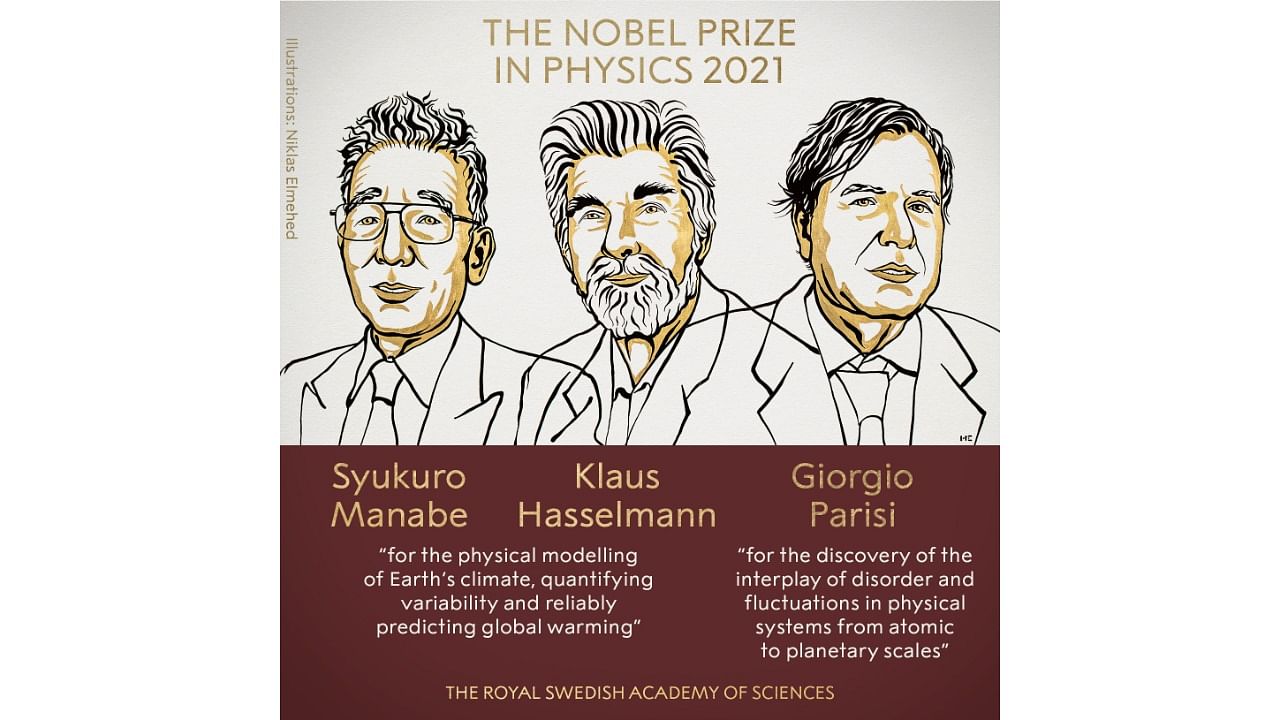
The Nobel Prize in Physics was awarded on Tuesday to three scientists whose work “laid the foundation of our knowledge of the Earth’s climate and how humanity influences it.”
The winners were Syukuro Manabe of Princeton University, Klaus Hasselmann of the Max Planck Institute for Meteorology in Hamburg, Germany, and Giorgio Parisi of the Sapienza University of Rome.
The work of all three is essential to understanding how the Earth’s climate is changing and how human behavior is influencing those changes.
“The discoveries being recognized this year demonstrate that our knowledge about the climate rests on a solid scientific foundation, based on a rigorous analysis of observations,” said Thors Hans Hansson, chair of the Nobel Committee for Physics.
Complex systems, such as the climate, are often defined by their disorder. This year’s winners helped bring understanding to the seeming chaos, by describing those systems and predicting their long-term behavior.
Manabe demonstrated how increased levels of carbon dioxide in the atmosphere lead to increased temperatures on the surface of the Earth.
“In the 1960s, he led the development of physical models of the Earth’s climate and was the first person to explore the interaction between radiation balance and the vertical transport of air masses,” the committee said.
Hasselmann, a decade later, created a model that links weather and climate, “answering the question of why climate models can be reliable despite weather being changeable and chaotic,” the Nobel committee said in its statement.
Parisi’s discoveries were described as “among the most important contributions to the theory of complex systems.”
He is credited with the discovery of the interplay of disorder and fluctuations in physical systems from atomic to planetary scales.
“They make it possible to understand and describe many different and apparently entirely random materials and phenomena, not only in physics but also in other, very different areas, such as mathematics, biology, neuroscience and machine learning,” the committee said.
All three scientists have been working to understand the complex natural systems that have been driving climate change for decades, and their discoveries have provided the scaffolding on which predictions about climate are built.
The importance of their work has only gained urgency as the forecast models reveal an increasingly dire outlook if the rise in global temperature is not arrested.
The global average temperature will rise 2.7 degrees Celsius by century’s end even if all countries meet their promised emissions cuts, a rise that is likely to bring more extreme wildfires, droughts and floods, according to a United Nations report released in September.
That level of warming, measured against preindustrial levels, is likely to increase the frequency of deadly heat waves and threaten coastal cities with rising sea levels, the country-by-country analysis concluded.
“It’s clear that for the future generation, we have to act now in a very fast way,” Parisi said at a news conference after the prize was announced.
Manabe is a senior meteorologist and climatologist at Princeton University. Born in 1931 in Shingu, Japan, he earned his doctorate in 1957 from the University of Tokyo before joining the US Weather Bureau as a research meteorologist. In the 1960s, he led groundbreaking research into how increased levels of carbon dioxide lead to higher temperatures on the surface of the Earth. That work “laid the foundation for the development of current climate models,” according to the Nobel judges.
Hasselmann is a German physicist and oceanographer who greatly advanced public understanding of climate change through the creation of a model that links climate and chaotic weather systems. He is a professor at the Max Planck Institute for Meteorology in Hamburg. He received his doctorate in 1957 from the University of Göttingen in Germany before founding the meteorology institute, which he was head of until 1999. He is also the founder of what is now known as the Global Climate Forum. In 2009, Hasselmann received the 2009 BBVA Foundation Frontiers of Knowledge Award in Climate Change.
Parisi is an Italian theoretical physicist who was born in 1948 in Rome and whose research has focused on quantum field theory and complex systems. He received his doctorate from the Sapienza University of Rome in 1970. In 1980, he was responsible for discovering hidden patterns in disordered complex materials. He is a professor at the Sapienza University of Rome.
Check out latest videos from DH:
(With AP inputs)